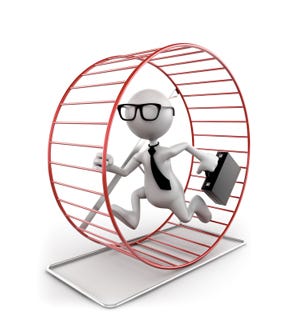Fight - Flight - Freeze
If you are training the physical body when the body is under stress, then you are training based on your emotions
When the body is under stress, it triggers a physiological response known as the "fight or flight" response. This response is an automatic reaction to perceived threats or danger, preparing the body to either confront or flee from the threat. Here's what happens during this response.
Over the past 4 years, the mind and the body have been disconnected, in layman's terms, this is the brain and gut connection. When the body is under stress the blood leaves the pre-frontal cortex of the brain and the muscles in your gut freeze (tighten up)
I have three questions (two-part questions) for people working in the recovery market.
If you use any compression pants, if you are pumping stress through the body in this state, is this lowering or raising the cortisol levels?
Clue: Skinny legs, inflamed stomach.
When you wake up tired and you train the physical body, are you an endorphin chaser or are you training on your emotions?
Clue: Relying on caffeine to see you through the day, yawning or lethargic a few hours after your workout.
Do you take recovery half weeks or full weeks?
Clue: Elite athletes are doing half or full recovery weeks, every 12-16 weeks of training.
Dangers of ignoring your body - You just need to look at the amount of elite athletes who have died suddenly in the past 3 years (look into spike proteins caused by the jab, that should be your first port of call)
1. Activation of the Sympathetic Nervous System:
- The hypothalamus in the brain signals the adrenal glands to release adrenaline (epinephrine) and noradrenaline (norepinephrine).
- These hormones increase heart rate, blood pressure, and respiration rate, directing more oxygen to the muscles.
Ignoring these signs: Fatigue - Burnout - Chronic Fatigue - Adrenal failure - Kidney replacement.
2. Energy Mobilisation:
- Glucose and fats are released into the bloodstream from energy stores to provide immediate fuel for the body.
- The liver converts glycogen to glucose to supply additional energy.
3. Increased Blood Flow to Muscles:
- Blood vessels in the skin and digestive system constrict, redirecting blood to the muscles and vital organs.
- This ensures that the muscles have enough oxygen and nutrients to function effectively.
Ignoring these signs: Raised cortisol levels - Stress - Stroke - Heart attack - Pacemaker
4. Enhanced Senses and Mental Alertness:
- Pupils dilate to improve vision.
- The brain becomes more alert, enhancing the ability to think quickly and react to the situation.
5. Suppression of Non-Essential Functions:
- Functions that are not immediately necessary for survival, such as digestion and immune response, are temporarily suppressed.
When you train or exercise under stress, these physiological changes can have several impacts:
1. Overtraining and Fatigue:
- Continuous exposure to high levels of stress hormones can lead to overtraining, fatigue, and burnout.
- It may also increase the risk of injury due to muscle tension and decreased recovery time.
2. Impaired Recovery:
- Chronic stress can impair the body's ability to recover from exercise, leading to prolonged muscle soreness and slower healing.
- It can also suppress the immune system, making you more susceptible to illness.
3. Mental Health Impact:
- Persistent stress can negatively affect mental health, leading to anxiety, depression, and decreased motivation for training.
Conclusion
To manage stress effectively while training, consider incorporating relaxation techniques such as deep breathing, meditation, and adequate rest and recovery = grounding infra-red recovery mats - PEMF Watches (all of the mentioned require almost zero noncalorific expenditure)
Balancing intense workouts with activities that promote relaxation and well-being can help mitigate the negative effects of stress on your body and mind.
Moral of the story
Any signal the body is giving is a message, that can either bump you or violently remove you.




